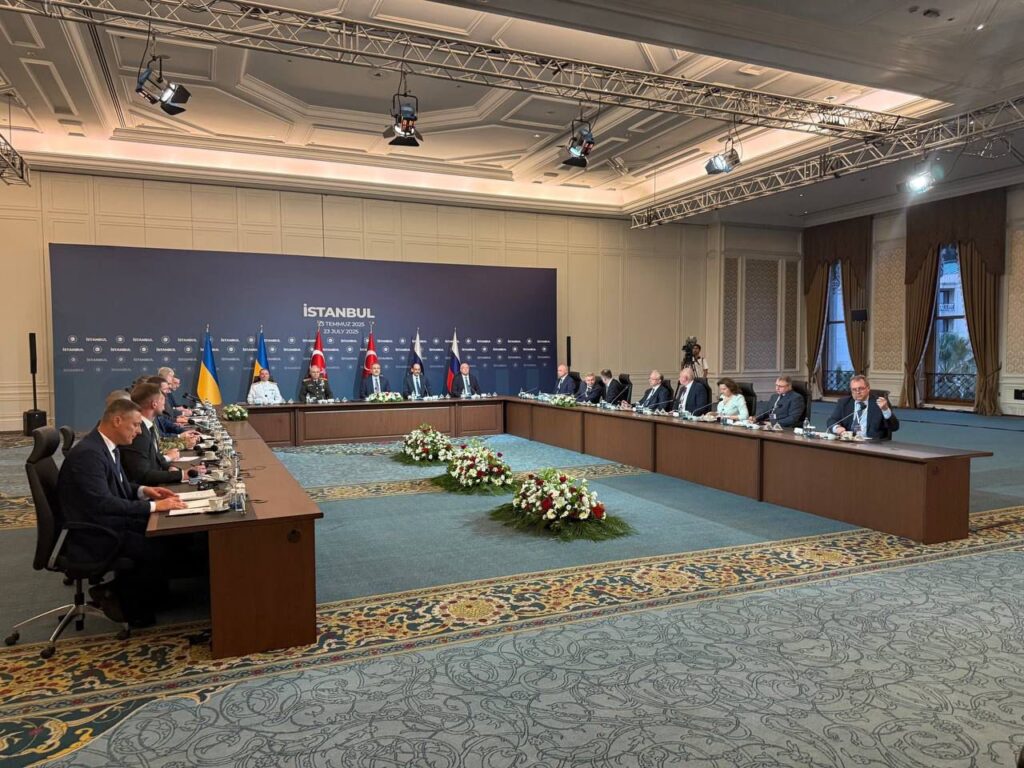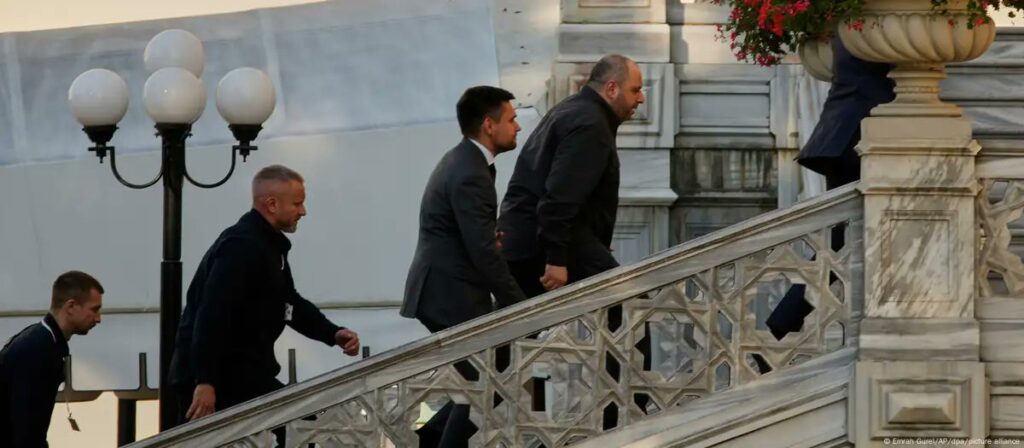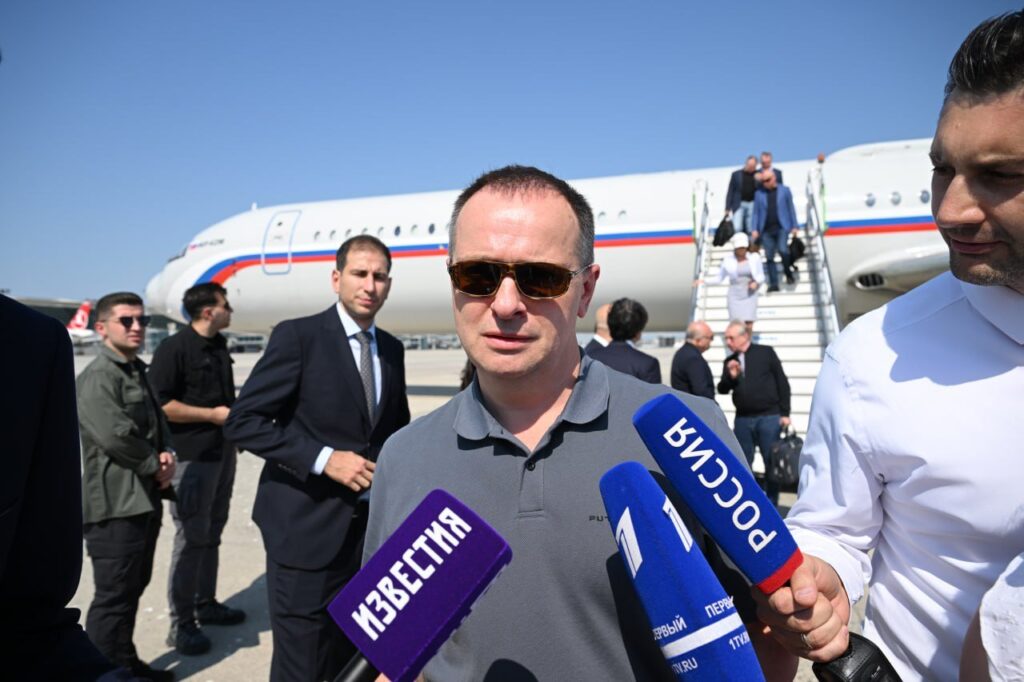Russia and Ukraine met in Istanbul for the third time—and agreed on one thing: swapping POWs

Ukrainian and Russian delegations met in Türkiye for the third time this year for peace talks. The negotiations, held behind closed doors in Istanbul, lasted less than an hour and centered on a possible ceasefire, large-scale prisoner exchanges, and the idea of a summit between the two countries’ presidents.
At the opening of the talks, Turkish Foreign Minister Hakan Fidan reiterated Türkiye’s role as mediator, calling for an end to what he described as a “bloody war.”
“Our goal is to end this bloody war as soon as possible,” said Fidan. “The ultimate objective is a ceasefire that paves the way to peace.”
Ukraine pushes for Presidential meeting and immediate ceasefire
Leading Ukraine’s delegation was Rustem Umerov, now Secretary of the National Security and Defense Council. He proposed a face-to-face meeting between Presidents Volodymyr Zelenskyy and Vladimir Putin by the end of August.
“If Russia agrees, it will show the world it’s ready for constructive dialogue,” Umerov said.
Kyiv also reiterated its demand for a full and unconditional ceasefire, including a complete halt to attacks on civilian and energy infrastructure. Umerov emphasized that this is a non-negotiable basis for diplomacy to succeed.
He also stressed that Ukraine had prioritized the humanitarian track, including the release of civilians and children held by Russia.

Russia signals movement on humanitarian issues, but not on core disputes
As in the previous two rounds, Russia was represented by Vladimir Medinsky, a senior aide to President Putin. He confirmed that Moscow and Kyiv are finalizing a 250-for-250 prisoner exchange and preparing a second phase involving 1,200 individuals, including civilians.
“Russia has already returned over 7,000 bodies of Ukrainian soldiers,” Medinsky said. “Another 3,000 are ready for transfer.”
He also revealed that Russia is ready to exchange 30 detained Ukrainian soldiers for Russian civilians held in Ukraine.
Medinsky floated proposals for limited 24–48 hour ceasefires to allow the recovery of the dead and wounded. He also suggested the formation of three online working groups to maintain contact between rounds. Ukraine has agreed to consider the idea.
On more sensitive issues—like the deportation of Ukrainian children to Russia—Medinsky claimed that many on Ukraine’s list “were never on Russian territory,” but confirmed that discussions would continue.
However, he acknowledged that Ukraine and Russia remain “far apart” on any settlement agreements.

Delegation makeup and negotiation priorities
The Ukrainian team included 14 high-ranking officials, such as:
- Serhiy Kyslytsia, First Deputy Foreign Minister
- Oleksandr Bevz, presidential advisor
- Yevhen Ostrianskyi, Deputy Chief of the General Staff
- Vadym Skibitskyi, Deputy Head of Intelligence
- Oleksandr Dyakov, Deputy Chief of Naval Operations
A source in the Ukrainian delegation told BBC Ukraine that Kyiv came focused on three main priorities:
- The return of Ukrainian detainees, especially civilians and children
- A long-term and complete ceasefire
- A summit between Zelenskyy and Putin
“Our position is constructive. But peace depends on whether Russia abandons the language of ultimatums,” the source said.
Zelenskyy: “Ukraine never wanted this war”
Ahead of the talks, President Volodymyr Zelenskyy reaffirmed Ukraine’s willingness to negotiate in good faith and expressed readiness to meet with Putin personally.
“Ukraine never wanted this war. Russia started it, and Russia must end it,” he said.
His office also confirmed that the Ukrainian delegation was acting under a classified directive approved by presidential decree, which defined the negotiating framework.
Global pressure and the “Trump ultimatum”
This round of talks came amid growing international pressure. Former US President Donald Trump recently issued a 50-day ultimatum to Russia to stop hostilities or face renewed sanctions. Trump also pledged additional arms for Ukraine, albeit largely via European partners.
Analysts say the timing is not accidental. According to BBC correspondent Elizaveta Fokht, both sides are eager to demonstrate flexibility to a US audience.
“This is a performance for a single, high-stakes viewer: Donald Trump,” Fokht noted. “Ukraine wants to show it’s willing to talk. Russia wants to show it isn’t sabotaging diplomacy.”
Realistic goals: Focus on humanitarian gains
While no agreement was reached on a ceasefire or summit date, both sides reaffirmed commitment to continue humanitarian exchanges—one of the few areas where tangible progress has been made since talks resumed in May and June.
Those earlier rounds led to the return of over 1,000 prisoners and multiple repatriations of fallen soldiers.
Despite the growing toll of war—including intensified Russian drone and missile attacks on Ukrainian cities in recent weeks—channels for negotiation remain open.
Whether they lead to a breakthrough or not, a fourth round of talks is now expected in the near future.